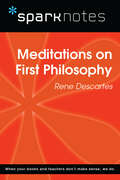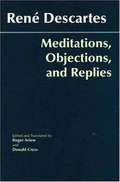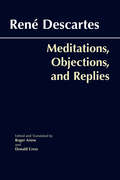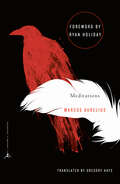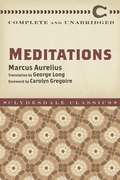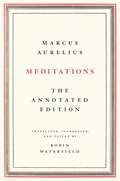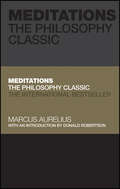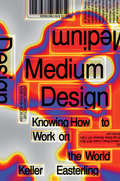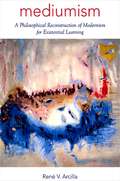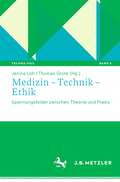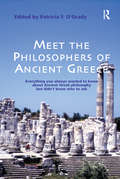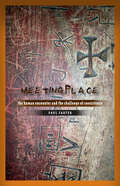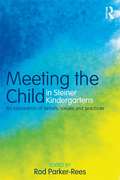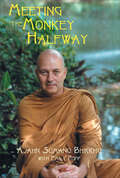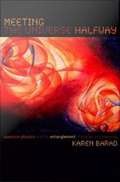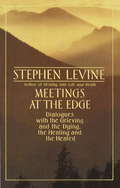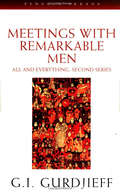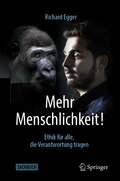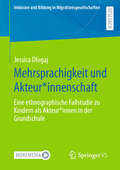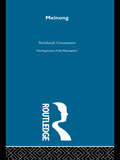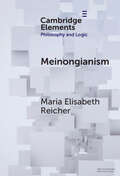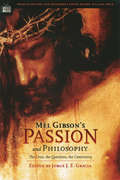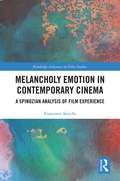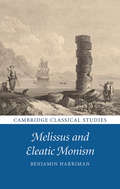- Table View
- List View
Meditations on First Philosophy (SparkNotes Philosophy Guide)
by SparkNotesMeditations on First Philosophy (SparkNotes Philosophy Guide) Making the reading experience fun! SparkNotes Philosophy Guides are one-stop guides to the great works of philosophy–masterpieces that stand at the foundations of Western thought. Inside each Philosophy Guide you&’ll find insightful overviews of great philosophical works of the Western world.
Meditations, Objections, and Replies
by Roger Ariew Rene Descartes Donald CressAmong the strengths of this edition are reliable, accessible translations, useful editorial materials, and a straightforward presentation of the Objections and Replies, including the Objections from Caterus, Arnauld, and Hobbes, and Descartes' Replies, in their entirety. 'The Letter Serving as a Reply to Gassendi' -- in which several of Descartes' associates present Gassendi's best arguments and Descartes' replies -- conveys the highlights and important issues of their notoriously extended exchange. Roger Ariew's illuminating general Introduction discusses the Meditations and the intellectual environment surrounding its reception. Also included are a bibliography and chronology.
Meditations, Objections, and Replies
by René Descartes Roger Ariew Donald CressThis edition features reliable, accessible translations; useful editorial materials; and a straightforward presentation of the Objections and Replies, including the objections from Caterus, Arnauld, and Hobbes, accompanied by Descartes' replies, in their entirety. The letter serving as a reply to Gassendi--in which several of Descartes' associates present Gassendi's best arguments and Descartes' replies--conveys the highlights and important issues of their notoriously extended exchange. Roger Ariew's illuminating Introduction discusses the Meditations and the intellectual environment surrounding its reception.
Meditations: A New Translation (Oxford World's Classics)
by Marcus AureliusNATIONAL BESTSELLER • &“Meditations offers a glimpse into [Marcus Aurelius&’s] mind, his habits, and his approach to life. . . . I think any reader would find something useful to take away from it.&”—James Clear, #1 New York Times bestselling author of Atomic Habits &“To me, this is the greatest book ever written. . . . It is the definitive text on self-discipline, personal ethics, humility, self-actualization, and strength. . . . If you&’re going to read it, you absolutely have to go with the Gregory Hays translation.&”—Ryan Holiday, #1 New York Times bestselling author of The Obstacle Is the Way &“It is unbelievable to see how the emperor&’s words have stood the test of time. . . . Read a page or two anytime you feel like the world is too much.&”—Arnold Schwarzenegger, The Wall Street Journal Nearly two thousand years after it was written, Meditations remains profoundly relevant for anyone seeking to lead a meaningful life. Your ability to control your thoughts—treat it with respect. It&’s all that protects your mind from false perceptions—false to your nature, and that of all rational beings. A series of spiritual exercises filled with wisdom, practical guidance, and profound understanding of human behavior, Marcus Aurelius&’s Meditations remains one of the greatest works of spiritual and ethical reflection ever written. With bite-size insights and advice on everything from living in the world to coping with adversity and interacting with others, Meditations has become required reading not only for statesmen and philosophers alike, but also for generations of readers who responded to the straightforward intimacy of his style. In Gregory Hays&’s translation—the first in nearly four decades—Marcus&’s thoughts speak with a new immediacy. In fresh and unencumbered English, Hays vividly conveys the spareness and compression of the original Greek text. Never before have Marcus&’s insights been so directly and powerfully presented.With an Introduction that outlines Marcus&’s life and career, the essentials of Stoic doctrine, the style and construction of the Meditations, and the work&’s ongoing influence, this edition makes it possible to fully rediscover the thoughts of one of the most enlightened and intelligent leaders of any era.
Meditations: Complete and Unabridged (Oxford World's Classics)
by Marcus Aurelius Carolyn GregoireAll twelve books by Roman Emperor Marcus Aurelius – his personal guidelines to live and rule well. “Do every deed, speak every word, think every thought in the knowledge that you may end your days any moment.” “We have body, soul, and intelligence. To the body belong the senses, to the soul the passions, to the intelligence principles.” “Think not as your insulter judges or wishes you to judge: but see things as they truly are.” “To pursue impossibilities is madness; and it is impossible that the wicked should not act in some such way as this.” “Order not your life as though you had ten thousand years to live. Fate hangs over you. While you live, while yet you may, be good.”Meditations is a collection of twelve books written by Roman Emperor Marcus Aurelius. This set of book was originally compiled in the form of private journals. Marcus Aurelius used these notes as personal guides to live by and to better himself as a ruler. He compiled these journals during his time as emperor, and while they were not intended for public consumption, there are valuable lessons to be gleaned from his wisdom. The entries include his views of stoicism—the Hellenistic philosophy devoid of “destructive emotions” that could tamper with logic—and its practical use in ruling and military tactics.Completely unabridged, with a new foreword written by Huffington Post writer Carolyn Gregoire, this publication of Meditations is an all-encompassing collection of Marcus Aurelius’s works.
Meditations: The Annotated Edition
by Marcus AureliusThis definitive annotated translation of Marcus Aurelius's Meditations is an insightful look into the mind of Ancient Rome's sixteenth emperor. Marcus Aurelius Antoninus (121-180 CE) was the sixteenth emperor of Rome—and by far the most powerful man in the world. Yet he was also an intensely private person, with a rich interior life and one of the wisest minds of his generation. He collected his thoughts in notebooks, gems that have come to be called his Meditations. Never intended for publication, the work has proved an inexhaustible source of wisdom and one of the most important Stoic texts of all time. In often passionate language, the entries range from one-line aphorisms to essays, from profundity to bitterness.This annotated edition offers the definitive translation of this classic and much beloved text, with copious notes from world-renowned classics expert Robin Waterfield. It illuminates one of the greatest works of popular philosophy for new readers and enriches the understanding of even the most devoted Stoic.
Meditations: The Philosophy Classic (Capstone Classics)
by Marcus AureliusA deluxe special edition of the ancient classic written by the Roman Emperor known as “The Philosopher” Meditations is a series of personal journals written by Marcus Aurelius, Emperor of Rome from 169 to 180 AD. The last of the “Five Good Emperors,” he was the most powerful and influential man in the Western world at the time. Marcus was one of the leaders of Stoicism, a philosophy of personal ethics which sought resilience and virtue through personal action and responsibility. Stoicism, viewed as a foundation of modern self-help, has inspired many personal development and psychotherapy approaches through to the present day. Meditations is perhaps the most important source of our modern understanding of Stoic philosophy. Its twelve books chronicle different stages of Marcus Aurelius’ life and ideas. Although he ruled during the Pax Romana, the age of relative peace and stability throughout the empire, his reign was marked by near-constant military conflict and a devastating plague which killed upwards of five million people. Aurelius’ writings give modern readers an unprecedented look into the “spiritual exercises” which helped him through his tumultuous life and strengthened his patience, empathy, generosity, self-knowledge and emotional health. The private reflections recorded in the Meditations were never meant to be published, rather they were a source for Marcus’ own guidance and self-improvement, and jotted down by campfires or in military tents on the Roman front. The lessons, insights and perspectives contained within this remarkable work are just as relevant today as they were two millennia ago. This volume: Presents the timeless wisdom of Emperor Marcus Aurelius and his Stoic philosophy, with new research on his life and times Contains valuable insights on topics such as resilience, moderation and emotional control Discusses how to live “in agreement with nature” and abide by strong ethical principles Part of the bestselling Capstone Classics Series edited by Tom Butler-Bowdon, this attractive, high-quality hardcover volume includes: An original Introduction by Marcus Aurelius authority and Stoicism expert Donald Robertson, author of How To Think Like A Roman Emperor. A modernised, up to date version of the classic George Long translation. Meditations: The Philosophy Classic is a volume which will occupy a prominent place in any library for years to come.
Medium Design: Knowing How to Work on the World
by Keller EasterlingHow to Design the World: Working Without SolutionsIn Medium Design everyone is a designer. But design, in this case, inverts the typical focus on object over its settings to concentrate on the medium—the matrix space between objects, events, and ideological declarations. It disrupts habitual modern approaches to the world&’s intractable dilemmas—from climate cataclysm to inequality to concentrations of authoritarian power. In a series of case studies dealing with everything from automation and migration to explosive urban growth and atmospheric changes, Medium Design offers spatial tools for innovation and global decision-making to challenge the authority of more familiar legal or economic approaches.From this perspective, solutions are mistakes and ideologies are unreliable guides. Rather than the modern desire for the new, designers find more sophistication in relationships between emergent and incumbent technologies. Encouraging entanglement, medium design does not try to eliminate problems but rather to put them together in productive combinations. And in the process of reconceptualizing design, Easterling puzzles over bulletproof powers, Stanley Kubrick, ISIS recruits, literary characters, and iconic activists in the hope of outwitting political deadlocks and offering forms of activism for modulating power and temperament in organizations of all kinds.
Mediumism: A Philosophical Reconstruction of Modernism for Existential Learning
by René V. ArcillaMediumism considers what the modernist movement in the arts could mean for us today. It examines how artists and critics, particularly in the visual arts, responded to the growth of industries of distraction since the nineteenth century by creating new kinds of artworks that stress their mediums. René V. Arcilla draws out the metaphysical and ethical implications of the work of critics Clement Greenberg, T. J. Clark, and Michael Fried from a perspective rooted in existentialism. He finds in the resulting moral orientation a way to understand the distinctive purpose of liberal education and its political resistance to consumerism. Eschewing terminology that would be familiar to only one set of specialists, the book aims to be accessible to a general audience as well as to readers interested in modernist art, cultural politics, existentialist philosophy, and the philosophical principles of liberal education.
Medizin – Technik – Ethik: Spannungsfelder zwischen Theorie und Praxis (Techno:Phil – Aktuelle Herausforderungen der Technikphilosophie #5)
by Janina Loh Thomas GroteVermutlich sind sich Technik und Mensch nirgendwo so nahe, sind auf intime und verbindliche Weise miteinander verschränkt, wie in den Bereichen von Medizin, Therapie und Pflege. Am Nexus von Medizin und Technik werden deshalb zahlreiche ethische Fragen aufgeworfen. Dieser Band verfolgt das zweifache Anliegen, die Verschränkungen von Medizin, Technik und Ethik einerseits aus unterschiedlichen disziplinären Perspektiven zu beleuchten sowie andererseits einen Blick in die Praxis zu werfen, in die Erfahrungsräume der in der Medizin tätigen Menschen und ihre Interaktionen mit Technologien.
Meet Confucius - An eStory
by Charles MargerisonWords of wisdom beginning with "Confucius says" are heard on almost a daily basis. Few people know where this originated. Therefore, The Amazing People Club are proud to invite you to 'Meet Confucius', born in 500BC in China. So, what did Confucius actually say? He was a forward thinker and one of the most influential philosopher's in the world. A seeker of peace, he believed that if people co-operated with each other and society, this would end fighting and bring peace and stability. Be inspired by this passionate philosophical leader, whose teachings are as alive today as they were centuries ago. His story comes to life through BioViews®. These are short biographical narratives, similar to interviews. They provide an easy way of learning about amazing people who made major contributions and changed our world.
Meet the Philosophers of Ancient Greece: Everything You Always Wanted to Know About Ancient Greek Philosophy but didn't Know Who to Ask
by Patricia F. O’gradyAncient Greece was the cradle of philosophy in the Western tradition. Meet the Philosophers of Ancient Greece brings the thoughts and lives of the pioneers of Western philosophy down from their sometimes remote heights and introduces them to a modern audience. Comprising seventy essays, written by internationally distinguished scholars in a lively and accessible style, this book presents the values, ideas, wisdom and arguments of the most significant thinkers from the world of ancient Greece. Commencing with Thales of Miletus and continuing to the end of the Ancient Period of philosophy by way of Heraclitus, Parmenides, Protagoras, Socrates, Plato, Aristotle, Archimedes, Epictetus this book explores the major contributions of each philosopher as well as looking at archaeological and historical sites where they lived, worked and thought. This book is an outstanding introduction to the world of the philosophers of Ancient Greece.
Meeting Place: The Human Encounter and the Challenge of Coexistence
by Paul CarterIn this remarkable and often dazzling book, Paul Carter explores the conditions for sociability in a globalized future. He argues that we make many assumptions about communication but overlook barriers to understanding between strangers as well as the importance of improvisation in overcoming these obstacles to meeting. While disciplines such as sociology, legal studies, psychology, political theory, and even urban planning treat meeting as a good in its own right, they fail to provide a model of what makes meeting possible and worth pursuing: a yearning for encounter.The volume&’s central narrative—between Northern cultural philosophers and Australian societies—traverses the troubled history of misinterpretation that is characteristic of colonial cross-cultural encounter. As he brings the literature of Indigenous and non-Indigenous anthropological research into dialogue with Western approaches of conceptualizing sociability, Carter makes a startling discovery: that meeting may not be desirable and, if it is, its primary objective may be to negotiate a future of non-meeting. To explain the phenomenon of encounter, Carter performs it in differing scales, spaces, languages, tropes, and forms of knowledge, staging in the very language of the book what he calls &“passages.&” In widely varying contexts, these passages posit the disjunction of Greco-Roman and Indigenous languages, codes, theatrics of power, social systems, and visions of community. In an era of new forms of technosocialization, Carter offers novel ways of presenting the philosophical dimensions of waiting, meeting, and non-meeting.
Meeting the Child in Steiner Kindergartens: An Exploration of Beliefs, Values and Practices
by Rod Parker-ReesWhat can early years practitioners learn from Steiner kindergartens? What is distinctive about Steiner kindergarten teachers’ ways of getting to know children? As demands for accountability in Early Years settings continue to grow, external pressure to assess children and to measure their progress can disrupt the development of informal and intimate relationships between teachers and children. The contributors to this book, who include both experienced Steiner educators and early childhood experts from other backgrounds, have worked together to explore and understand what is distinctive about Steiner kindergarten practice. They present a variety of perspectives on the ways in which kindergarten teachers’ practices, values and beliefs can help children to find and construct their own identities, through play and through engagement in the life of their community. The authors explore key aspects of Steiner kindergarten practice, including caring for the physical environment, establishing rhythms and routines for children’s activity, and providing times and spaces in which teachers and children can get to know each other. By meeting with children and teachers, through rich accounts of day to day life in kindergartens and through accounts of the values and principles which inform their practice, readers will be encouraged to question and reflect on their own approaches to observation and assessment.
Meeting the Monkey Halfway
by Ajahn Sumano Bhikkhu Emily PoppAn American Buddhist monk in the Theravada tradition offers wisdom and spiritual practices on attaining mindful presence.Simple and straightforward, this “little book” is a distillation of twenty years of a Buddhist monk’s meditation practice. With a sense of reverence and respect for everything, Ajahn Sumano Bhikkhu shows us how to use only what we need, and then to use these few things carefully and with discrimination. Meeting the Monkey Halfway is his personal story, and through his story he will help us to open our hearts and relearn the compassion of the Buddha.
Meeting the Universe Halfway: Quantum Physics and the Entanglement of Matter and Meaning
by Karen BaradMeeting the Universe Halfway is an ambitious book with far-reaching implications for numerous fields in the natural sciences, social sciences, and humanities. In this volume, Karen Barad, theoretical physicist and feminist theorist, elaborates her theory of agential realism. Offering an account of the world as a whole rather than as composed of separate natural and social realms, agential realism is at once a new epistemology, ontology, and ethics. The starting point for Barad's analysis is the philosophical framework of quantum physicist Niels Bohr. Barad extends and partially revises Bohr's philosophical views in light of current scholarship in physics, science studies, and the philosophy of science as well as feminist, poststructuralist, and other critical social theories. In the process, she significantly reworks understandings of space, time, matter, causality, agency, subjectivity, and objectivity. In an agential realist account, the world is made of entanglements of "social" and "natural" agencies, where the distinction between the two emerges out of specific intra-actions. Intra-activity is an inexhaustible dynamism that configures and reconfigures relations of space-time-matter. In explaining intra-activity, Barad reveals questions about how nature and culture interact and change over time to be fundamentally misguided. And she reframes understanding of the nature of scientific and political practices and their "interrelationship. " Thus she pays particular attention to the responsible practice of science, and she emphasizes changes in the understanding of political practices, critically reworking Judith Butler's influential theory of performativity. Finally, Barad uses agential realism to produce a new interpretation of quantum physics, demonstrating that agential realism is more than a means of reflecting on science; it can be used to actually do science.
Meetings at the Edge: Dialogues with the Grieving and the Dying, the Healing and the Healed
by Stephen LevineBased on his extensive counseling work with the terminally ill, Levine's book integrates death into the context of life with compassion, skill, and hope. Capturing the range of emotions and challenges that accompany the dying process, he offers unique support to readers dealing with this difficult experience.
Meetings with Remarkable Men: Meetings with Remarkable Men Second Series (All and Everything)
by G. I. GurdjieffMeetings with Remarkable Men, G. I. Gurdjieff's autobiographical account of his youth and early travels, has become something of a legend since it was first published in 1963.<P><P> This is a book of lives, not doctrines, although readers will long value Gurdjieff's accounts of conversations with sages. Meetings conveys a haunting sense of what it means to live fully--with conscience, with purpose, and with heart. Among the remarkable individuals whom the reader will come to know are Gurdjieff's father (a traditional bard), a Russian prince dedicated to the search for Truth, a Christian missionary who entered a World Brotherhood deep in Asia, and a woman who escaped white slavery to become a trusted member of Gurdjieff's group of fellow seekers. <P>Gurdjieff's account of their attitudes in the face of external challenges and in the search to understand the mysteries of life is the real substance of this classic work.
Mehr Menschlichkeit!: Ethik für alle, die Verantwortung tragen
by Richard EggerMit diesem Buch führt Richard Egger in das komplexe Thema Ethik ein: in die Theorie der Menschlichkeit. Er richtet sich damit an Menschen, die Verantwortung für andere tragen – sei es als Vorgesetzte, als Ärztin oder Wissenschaftler, Mutter oder Vater, Lehrer oder in vielen anderen Rollen. Anhand von Beispielen aus unterschiedlichen Lebensbereichen zeigt Egger auf, welche Rolle Vernunft und Gefühl, aber auch unsere Gerechtigkeitsvorstellung für ethisches Handeln spielen. Sein Fazit: Menschlich handeln kann nur, wer einen Sinn für Fairness und Gleichwertigkeit, persönliche Verpflichtung und moralische Integrität entwickelt. Eine solche Haltung durchdringt den ganzen Menschen und macht Verantwortungsträger erst zu wirklichen Leadern.Egger stützt sich dabei auf die Fragen und Argumente, Regeln und Instrumente aus der Geschichte der Ethik, aber auch auf seine langjährige Erfahrung als Berater von Menschen. Der Autor schreibt philosophisch fundiert und gleichzeitig fesselnd und verständlich.Der InhaltDie Welt: Warum wir Ethik brauchenRegeln: Wie Ethik funktioniertSie: Was Ethik aus Ihnen machtNatur: Wie Ethik sich ins Ganze fügt
Mehrsprachigkeit und Akteur*innenschaft: Eine ethnographische Fallstudie zu Kindern als Akteur*innen in der Grundschule (Inklusion und Bildung in Migrationsgesellschaften)
by Jessica DlugajAusgehend von dem Befund, dass migrationsbedingte Mehrsprachigkeit zwar ein zentrales Thema der Erziehungswissenschaft darstellt, aber gleichzeitig wenig über die konkrete sprachliche Praxis mehrsprachiger Kinder in der Schule bekannt ist, widmet sich diese Fallstudie den sprachlichen Praktiken und Aushandlungen von Kindern an einer Grundschule. Dabei wird auf Basis einer ethnographischen Herangehensweise und unter Hinzunahme eines praxistheoretischen Agency-Konzeptes gezeigt, unter welchen Bedingungen es zur sprachlichen Handlungsfähigkeit von Kindern kommt und wie differenziert sich die mehrsprachige Situation von Kindern im Kontext von Migration im Feld Schule gestaltet.
Meinong-Arg Philosophers (Arguments Of The Philosophers Ser.)
by Reinhardt GrossmannFirst Published in 1999. Routledge is an imprint of Taylor & Francis, an informa company.
Meinongianism (Elements in Philosophy and Logic)
by Maria Elisabeth ReicherMeinongianism (named after Alexius Meinong) is, roughly, the view that there are not only existent but also nonexistent objects. In this book, Meinong's so-called object theory as well as “neo-Meinongian” reconstructions are presented and discussed, especially with respect to logical issues, both from a historical and a systematic perspective. Among others, the following topics are addressed: basic principles and motivations for Meinongianism; the distinction between “there is” (“ x”) and “exists” (“E!”); interpretations and kinds of quantification; Meinongianism, the principle of excluded middle and the principle of non-contradiction; the nuclear-extranuclear distinction and modes of predication; varieties of neo-Meinongianism and Meinongian logics.
Mel Gibson's Passion and Philosophy
by William Irwin Jorge J. GraciaMel Gibson's The Passion of the Christ has become one of the most controversial films ever made, and it is already a blockbuster of cinematography. Its defenders passionately regard it as one of the most moving and influential pieces of religious art ever created. But its detractors argue with comparable vehemence that the violence and gore it contains, its alleged anti-Semitism, a particular take on the Christian message, and the lack of historical and Biblical accuracy, make it nothing more than a kind of political propaganda. Father Thomas Rosica hailed as one of the great masterpieces of religious art, but the secular humanist Paul Kurtz thinks of it as a political weapon in the hands of the religious right. Film critics are divided in their judgment, giving the film anywhere from no stars to five stars. Regardless of what one thinks of the film, however, its impact both personal and social is beyond question.
Melancholy Emotion in Contemporary Cinema: A Spinozian Analysis of Film Experience (Routledge Advances in Film Studies)
by Francesco SticchiThis work outlines a new methodology for film analysis based on the radical materialist thought of Baruch Spinoza, re-evaluating contemporary cognitive media theory and philosophical theories on the emotional and intellectual aspects of film experience. Sticchi’s exploration of Spinozian philosophy creates an experiential constructive model to blend the affective and intellectual aspects of cognition, and to combine it with different philosophical interpretations of film theory. Spinoza’s embodied philosophy rejected logical and ethical dualisms, and established a perfect parallelism between sensation and reason and provides the opportunity to address negative emotions and sad passions without referring exclusively to traditional notions such as catharsis or sublimation, and to put forth a practical/embodied notion of Film-Philosophy. This new analytical approach is tested on four case studies, films that challenge the viewer’s emotional engagement since they display situations of cosmic failure and depict controversial and damaged characters: A Serious Man (2009); Melancholia (2011); The Act of Killing (2012) and Only Lovers Left Alive (2013). This book is an important addition to the literature in Film Studies, particularly in Cognitive Film Theory and Philosophy of Film. Its affective and semantic analyses of film experience (studies of embodied conceptualisation), connecting Spinoza’s thought to the analysis of audiovisual media, will also be of interest to Philosophy scholars and in academic courses of film theory, film-philosophy and cognitive film studies.
Melissus and Eleatic Monism (Cambridge Classical Studies)
by Benjamin HarrimanIn the fifth century BCE, Melissus of Samos developed wildly counterintuitive claims against plurality, change, and the reliability of the senses. This book provides a reconstruction of the preserved textual evidence for his philosophy, along with an interpretation of the form and content of each of his arguments. A close examination of his thought reveals an extraordinary clarity and unity in his method and gives us a unique perspective on how philosophy developed in the fifth century, and how Melissus came to be the most prominent representative of what we now call Eleaticism, the monistic philosophy inaugurated by Parmenides. The rich intellectual climate of Ionian enquiry in which Melissus worked is explored and brought to bear on central questions of the interpretation of his fragments. This volume will appeal to students and scholars of early Greek philosophy, and also those working on historical and medical texts.
